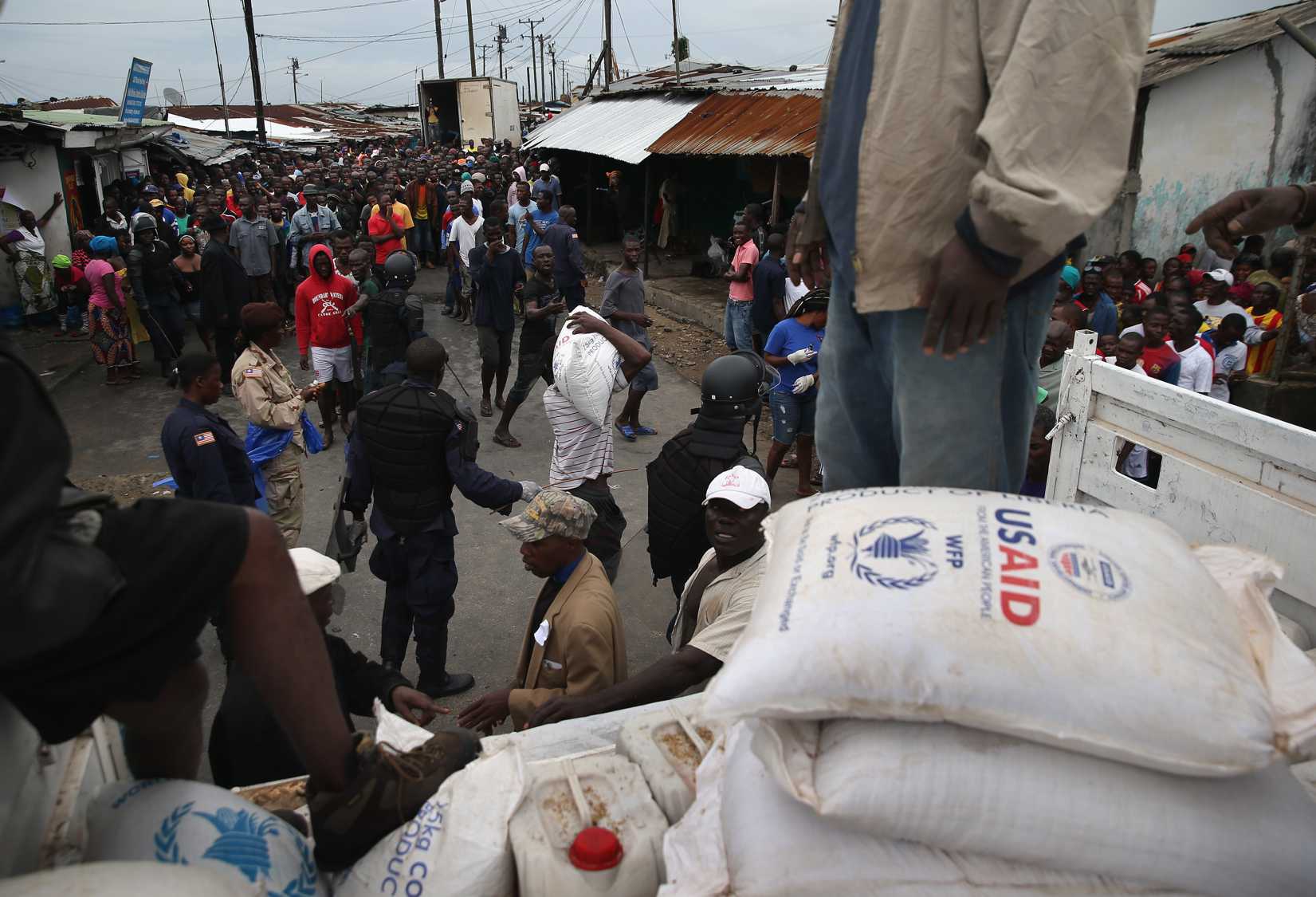
A few weeks ago, West Point was merely the worst slum in war-racked Liberia. Today, it is both that and the most notorious urban center of the world’s worst Ebola outbreak.
It is also quarantined from the rest of the Liberian capital Monrovia, and its dank alleyways subject to a nightly curfew. Barricades and barbed wire have gone up, and troops posted. Ships started patrolling the waterfront on Wednesday to further restrict the movement of the 70,000 or so residents. Food prices have skyrocketed. On Thursday, hundreds of people lined up for government handouts of rice and water.
“At the moment West Point is stuck at a standstill and is in an anarchy situation,” Moses Browne of aid group Plan International told the Associated Press.
Over 1,400 people have died in the five-month Ebola outbreak, and Liberia is the country that has been worst hit. Almost a thousand people have been confirmed infected, and more than half of them have already died. Rural Lofa County is worst hit part of the country, but when it was found that Ebola had made its way into West Point, authorities became alarmed.
“There’s a higher risk of contagion for any infectious disease in an environment that is so crowded and that lacks running water and proper sanitation,” Kamalini Lokuge, a research fellow at Australian National University’s College of Medicine, Biology and Environment tells TIME.
With only four toilets, that environment would be West Point.
Adds Lokuge: “Ebola is nowhere as contagious as the flu, but you need to spread knowledge about how it is transmitted in order to control it.”
Over the past week, this has proven to be one of the gravest problems in West Point. On Saturday, a health center was looted and Ebola patients sent running, after a rumor spread that infected people were being brought in from other parts of the country. Others refused to believe the disease existed. “There is no Ebola,” some protesters attacking the clinic shouted.
“There is a high level of disbelief in the government in West Point,” Sanj Srikanthan, the International Rescue Committee’s emergency response director in Liberia, tells TIME. “The government has made a concerted effort to reach out to community leaders, youth groups and churches with the message that the only way to contain the disease is to understand it. But some people still believe Ebola is a conspiracy, and those people we need to reach.”
But even in West Point itself, conveying the gravity of the disease is a challenge. “There’s a degree of anger, people are feeling they are being neglected for others,” Srikanthan says. “This makes it harder to convince people of the seriousness of Ebola.”
Clashes erupted between West Point residents and police when the barricades were first raised and the 9 pm to 6 am curfew imposed, and the area is still tense.
On Thursday, senior United Nations officials arrived in Africa to oversee the Ebola response, including Secretary General Ban Ki-Moon’s pointman David Nabarro. Srikanthan, like other aid workers, believe the presence of dignitaries is of utmost importance .
“This is a forgotten corner of the world facing an unprecedented situation,” he said. “This is still a containable outbreak, but local resources are simply overwhelmed. It would be great to see some recognizable faces taking control over certain aspects of the response.”
He also believes that the situation is not entirely hopeless.
“The situation may be catastrophic, but it is one that can be turned around,” he says. “I think the risks have been overhyped, and that even humanitarians are, to an extent, affected by the fears reported by media. Being in Monrovia, you’re not necessarily going to get Ebola, it’s not airborne.”
More Must-Reads from TIME
- Cybersecurity Experts Are Sounding the Alarm on DOGE
- Meet the 2025 Women of the Year
- The Harsh Truth About Disability Inclusion
- Why Do More Young Adults Have Cancer?
- Colman Domingo Leads With Radical Love
- How to Get Better at Doing Things Alone
- Michelle Zauner Stares Down the Darkness
Contact us at letters@time.com